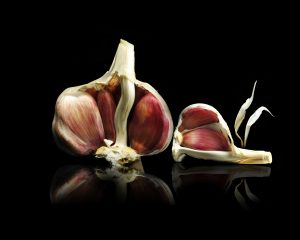The Health Benefits of Garlic; Latest Research
Posted by Phil Heler, MD on December 17, 2018Garlic is one of the most researched and bestselling herbal products. It has been traditionally used for centuries for many health-related issues
Today I am writing about garlic and its health benefits. Many modern-day medications are derived from plants. Salicylic acid is a good example, this is the fundamental ingredient in aspirin; it is basically a plant hormone and can be found in many fruits and vegetables ranging from cucumbers to tomatoes. Perceiving plant foods as beneficial diet is advised by the folklore of many cultures over centuries. I have decided to revisit the most popular natural health products and investigate relative merits based on the latest research.
The Benefits of Garlic are Well Documented
Garlic is part of the allium family which also includes onions. This has been traditionally used for centuries for many health-related issues and, of course, it is now a common household item. Ancient Chinese and Indian medicine recommended garlic to aid respiration and digestion, to treat leprosy and parasitic infestation. Garlic has also played as an important medicine to Sumerian and the ancient Egyptians. There is some evidence that during the earliest Olympics in Greece, garlic was fed to the athletes for increasing stamina.
Today, clinically, garlic has been evaluated for several purposes and there are many research papers revolving around the different compounds in garlic. Some of these are thought to reduce the risk for cardiovascular diseases, have anti-tumour and anti-microbial effects, and show benefit on high blood glucose concentration. The research behind many of these claims, however, remains somewhat uncertain and contradictory.
Garlic’s properties are well documented; much of its value is related to its capacity and efficiency in absorbing sulphates from soils which are then incorporated by the plant into amino acids and sulphur storage molecules. This capacity helps give the plant an ecological advantage. When we eat garlic these sulphur storage molecules can be broken down into about 50 different sulphur containing compounds many of which are biologically active and follow a plethora of metabolic pathways. The main potent active ingredient is called Allicin (this gives garlic its distinctive odour) but even garlic products without Allicin are thought to have biological impact.
Garlic Products
There is a great deal of variation among garlic products sold for medicinal purposes. The concentration of Allicin strictly depends on processing method. Allicin as an ingredient is very unstable, and quickly decomposes into a different compound. This is heavily influenced by how the garlic formulations are prepared or consumed (whether eaten fresh, roasted or pressed in oil). These variables will generate many different highly reactive compounds, all of which follow different specific metabolic pathways, that are hard to research and understand. Common mechanisms of action are subsequently very hard to identify, so it comes with no great surprise that research is inconsistent.
Latest Research on Health Benefits
Despite misgivings there is some promising new research that has been published this year in ‘Trends in Pharmacological Sciences’ by Rose et al (2018) titled ‘Garlic and Gas Mediators’. This study was significant as it looked at what are known as ‘gaseous signalling molecules’. Nitric oxide and hydrogen sulphite for example are common gaseous signalling molecules in human cell physiology. These molecules are very important in cell communication and in maintaining homeostasis, they help reduce cellular damage and stress. Levels of gaseous signalling molecules are reduced in many diseases such as Alzheimer’s. Sulphur compounds from garlic (such as Diallyl Trisulphide) appeared to increase the levels of these precious molecules. The author suggested that there could a potential to modify garlic or onions so that they produce more of these compounds. The author himself states: “In many diseases, we often find that the levels of gaseous signalling molecules like hydrogen sulphide are reduced. As such, researchers are now developing donor drugs that can release hydrogen sulphide and hopefully replenish its levels in human cells and reduce disease symptoms or severity. Since food components also change the levels of these gases in our cells, it becomes imperative to identify those as well”, he added. “Based on current research, garlic or more specifically, its sulphur compounds, appear to be able to do this. However, this work is currently in its infancy and more research is needed,”
Another exciting research study was performed at the Los Angeles Biomedical Research Institute in 2016. The results were published that year by Varshney and Budoff in the Journal of Nutrition with the title ‘Garlic and Heart Disease’. This looked at the effect that garlic had on plaque formation in arteries and the progression of heart disease. This study involved 55 patients aged 40-75 years who had obesity, hypertension and cardiac risk factors. All these people underwent screening at the beginning of the study to measure their total coronary plaque formation. The screening was conducted using Cardiac Computed Tomography Angiography, a non-invasive imaging technology that accurately measures calcium deposits and plaque build-up in the arteries. Following evaluation, the participants were given either a placebo or a dose of 2,400 milligrams of Aged Garlic Extract every day. A follow-up screening conducted a year after the initial screening found those who had taken Aged Garlic Extract had slowed total plaque accumulation by 80%, reduced soft plaque and demonstrated regression (less plaque on follow-up) for low-attenuation plaque.
“This study is another demonstration of the benefits of this supplement in reducing the accumulation of soft plaque and preventing the formation of new plaque in the arteries, which can cause heart disease,” said Matthew J. Budoff, MD, an LA BioMed lead researcher. “We have completed four randomised studies, and they have led us to conclude that Aged Garlic Extract can help slow the progression of atherosclerosis and reverse the early stages of heart disease.”


